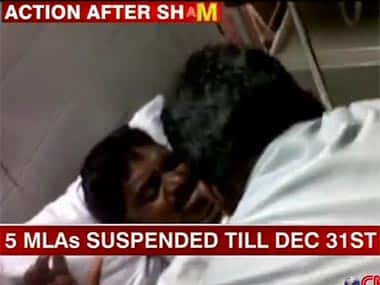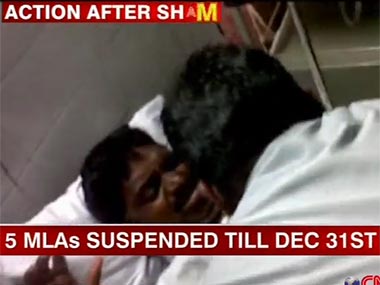The dramatics in Maharashtra legislature over a traffic police official’s alleged misconduct with a couple of MLAs is being played out in several acts. Act I – Sachin Suryavanshi, accosts two over-speeding MLAs on Mumbai’s sealink and a face-off ensues. Both sides record the fracas and claim it as evidence of the guilt of the other. Act II – During a privilege motion against him, he is spotted in the galleries and MLAs pounce on him and thrash him. [caption id=“attachment_676222” align=“alignleft” width=“380”] Traffic cop Sachin Suryavanshi. Image courtesy ibnlive.com[/caption] Act III – Five MLAs get suspended, two arrested, after the police top brass speak to the Chief Minister Prithviraj Chavan that taking the incident lightly would demoralise the force. Act IV – The two MLAs, Ram Kadam and Kshitij Thakur, are given bail on sureties of Rs 15,000 each, by a magistrate after they spent the weekend in the police cooler. Act V – Suddenly, Suryavanshi too is suspended. Act VI – Two Marathi news television editors, Nikhil Wagale and Rajeev Khandekar see a privilege motion against them for expressions and views they telecast on their respective channels, IBN-Lokmat and ABP Mhaja. What do all these add up to? Quite a lot, really. But let us look at three points. One, the legislators presume they have unfettered freedom and harbour a disproportionate sense of self-worth which can crack when touched by the ordinary world. Suryavanshi was only doing his mandated duty, but he has to suffer instead of being praised. If he did not deserve praise, then it ought to have been taken in stride for it is expected of him. It was not anything beyond the pale of his charter. Two, the legislators assume that when claiming they were demeaned by his actions while on duty and beating up a policeman, they were actually bringing down the esteem of the legislature by their conduct. They thought nothing of beating up a person within the premises where they enact laws. Nothing could be disgraceful, in fact, lawless than that. Three, under pressure from the MLAs, the chief minister, and his Home Minister RR Patil, backtrack from their earlier resolve to let the law take its course and suspend Suryavanshi. It adds up to a simple fact that when it comes to even the key branch of the executive arm of the government, the supremacy of politics holds its sway and the entire thing is locked up in a committee which will file a report eventually. No doubt this is a way of letting things cool down so the legislature which has suspended its other business, resume its purpose. But why should two MLAs take offence at all when stopped on the sealink for driving at speeds which was not only prohibited but posed danger to their own lives as well as to others’? Because, the prevailing view—not just now but for a long, long time—has been that MLAs, MLCs and MPs have that extra something that sets them apart from the people they think they rule. They cannot bear any affront though nothing in the parliamentary law says they are a privileged lot though they themselves vote unto themselves some privileges. Fifty-seven years ago, India’s first Speaker, PG Mavlankar had made it clear that it was not right for the elected representatives to cloth themselves in privileges that had nothing to do with their actions not involving their tasks as people’s representatives. Here is what he had said: “Privileges of Parliament do not place a member of Parliament on a footing different from that of an ordinary citizen in the manner of application of law, unless there are sufficient reasons in the interests of the Parliament itself to do so.” A sense of power, a feeling that they are above all others, a thin skin, are what goes into making a people’s representatives’ fragile self-image. Generally, they cannot stand in queues even to board an airline, they do not like being made to wait, nor being told that outside of the legislature, they are as good as a common citizen. They fail to understand that their real privilege is to make laws, to monitor the performance of the government and ensure that the common man gets his due. They think that a general demeanour of haughtiness is the skin they can wear. They wrongly mix up their immunity from trouble for speaking their minds out in the legislature in the interest of the people on whose behalf they make laws with an ill-placed belief that they have any general purpose immunity. Such immunity does not exist. What exists is invulnerability from any proceeding in any court for what they say within the House of which they are members, or of committees of which they are a part. Curiously, members of all law-making bodies, state assemblies to parliament, have refrained from codifying their privileges. If they were to, then it would not be possible to express outrage at a mere slight, intended or unintended, to them. Imagine someone asking a legislature to include a privilege for not respecting a speed limit, or brandishing a gun at a business rival. It would be laughable because action against such conduct would not be interfering with the business of the legislature.
Traffic cop Sachin Suryavanshi. Image courtesy ibnlive.com[/caption] Act III – Five MLAs get suspended, two arrested, after the police top brass speak to the Chief Minister Prithviraj Chavan that taking the incident lightly would demoralise the force. Act IV – The two MLAs, Ram Kadam and Kshitij Thakur, are given bail on sureties of Rs 15,000 each, by a magistrate after they spent the weekend in the police cooler. Act V – Suddenly, Suryavanshi too is suspended. Act VI – Two Marathi news television editors, Nikhil Wagale and Rajeev Khandekar see a privilege motion against them for expressions and views they telecast on their respective channels, IBN-Lokmat and ABP Mhaja. What do all these add up to? Quite a lot, really. But let us look at three points. One, the legislators presume they have unfettered freedom and harbour a disproportionate sense of self-worth which can crack when touched by the ordinary world. Suryavanshi was only doing his mandated duty, but he has to suffer instead of being praised. If he did not deserve praise, then it ought to have been taken in stride for it is expected of him. It was not anything beyond the pale of his charter. Two, the legislators assume that when claiming they were demeaned by his actions while on duty and beating up a policeman, they were actually bringing down the esteem of the legislature by their conduct. They thought nothing of beating up a person within the premises where they enact laws. Nothing could be disgraceful, in fact, lawless than that. Three, under pressure from the MLAs, the chief minister, and his Home Minister RR Patil, backtrack from their earlier resolve to let the law take its course and suspend Suryavanshi. It adds up to a simple fact that when it comes to even the key branch of the executive arm of the government, the supremacy of politics holds its sway and the entire thing is locked up in a committee which will file a report eventually. No doubt this is a way of letting things cool down so the legislature which has suspended its other business, resume its purpose. But why should two MLAs take offence at all when stopped on the sealink for driving at speeds which was not only prohibited but posed danger to their own lives as well as to others’? Because, the prevailing view—not just now but for a long, long time—has been that MLAs, MLCs and MPs have that extra something that sets them apart from the people they think they rule. They cannot bear any affront though nothing in the parliamentary law says they are a privileged lot though they themselves vote unto themselves some privileges. Fifty-seven years ago, India’s first Speaker, PG Mavlankar had made it clear that it was not right for the elected representatives to cloth themselves in privileges that had nothing to do with their actions not involving their tasks as people’s representatives. Here is what he had said: “Privileges of Parliament do not place a member of Parliament on a footing different from that of an ordinary citizen in the manner of application of law, unless there are sufficient reasons in the interests of the Parliament itself to do so.” A sense of power, a feeling that they are above all others, a thin skin, are what goes into making a people’s representatives’ fragile self-image. Generally, they cannot stand in queues even to board an airline, they do not like being made to wait, nor being told that outside of the legislature, they are as good as a common citizen. They fail to understand that their real privilege is to make laws, to monitor the performance of the government and ensure that the common man gets his due. They think that a general demeanour of haughtiness is the skin they can wear. They wrongly mix up their immunity from trouble for speaking their minds out in the legislature in the interest of the people on whose behalf they make laws with an ill-placed belief that they have any general purpose immunity. Such immunity does not exist. What exists is invulnerability from any proceeding in any court for what they say within the House of which they are members, or of committees of which they are a part. Curiously, members of all law-making bodies, state assemblies to parliament, have refrained from codifying their privileges. If they were to, then it would not be possible to express outrage at a mere slight, intended or unintended, to them. Imagine someone asking a legislature to include a privilege for not respecting a speed limit, or brandishing a gun at a business rival. It would be laughable because action against such conduct would not be interfering with the business of the legislature.
Mahesh Vijapurkar likes to take a worm’s eye-view of issues – that is, from the common man’s perspective. He was a journalist with The Indian Express and then The Hindu and now potters around with human development and urban issues.
)